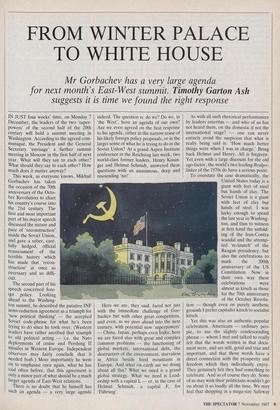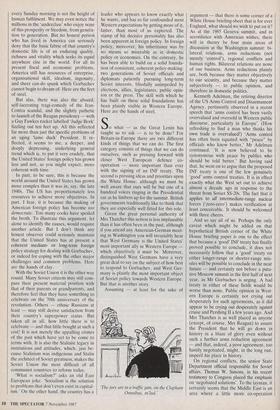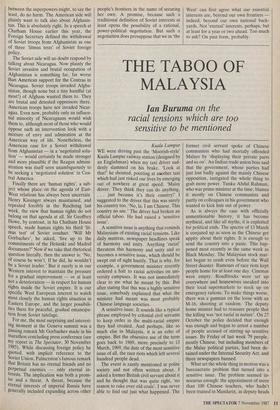FROM WINTER PALACE TO WHITE HOUSE
Mr Gorbachev has a very large agenda
for next month's East-West summit. Timothy Garton Ash
suggests it is time we found the right response
IN JUST four weeks' time, on Monday 7 December, the leaders of the two 'super- powers' of the second half of the 20th century will hold a summit meeting in Washington. According to the agreed com- muniqué, the President and the General Secretary 'envisage' a further summit meeting in Moscow in the first half of next year. What will they say to each other? What should they say to each other? How much does it matter anyway?
This week, as everyone knows, Mikhail Gorbachev has taken the occasion of the 70th anniversary of the Octo- ber Revolution to chart his country's course into the 21st century. The first and most important part of his major speech discussed the nature and pace of 'reconstruction' inside the Soviet Union, and gave a sober, care- fully hedged, official reassessment of the terrible history which has made that 'recon- struction' at once so necessary and so diffi- cult.
The second part of his speech concerned fore- ign policy. Looking ahead to the Washing- ton summit, he described the putative INF arms-reduction agreement as a triumph for `new political thinking' — the accepted Soviet code-phrase for what he's been trying to do since he took over. (Western leaders have rather ascribed that triumph to old political acting — i.e. the Nato deployments of cruise and Pershing II missiles in Western Europe. Independent observers may fairly conclude that it needed both.) More importantly he went on to emphasise once again, what he has said often before, that this agreement is only a minor part of what should be a much larger agenda of East-West relations.
There is no doubt that he himself has such an agenda — a very large agenda indeed. The question is: do we? Do we, in `the West', have an agenda of our own? Are we even agreed on the best response to his agenda, either in the narrow sense of his likely foreign policy proposals, or in the larger sense of what he is trying to do in the Soviet Union? At a grand Aspen Institute conference in the Reichstag last week, two world-class former leaders, Henry Kissin- ger and Helmut Schmidt, answered these questions with an unanimous, deep and resounding 'no!'
Here we are, they said, faced not just with the immediate challenge of Gor- bachev but with other great competitors, and even, as we peer ahead into the next century, with potential new 'superpowers' — China, Japan, perhaps even India; here we are faced also with great and complex common problems — the functioning of global markets, international debt, the destruction of the environment, starvation in Africa beside food mountains in Europe. And what on earth are we doing about all this? What we need is a grand global strategy. What we need is Lead- ership with a capital L — or, in the case of Helmut Schmidt, a capital F, for As with all such rhetorical performances by leaders emeritus — and who of us has not heard them, on the domestic if not the international stage? — one can never entirely avoid the suspicion that what is really being said is: 'How much better things were when I was in charge.' Bring back Helmut and Henry. All is forgiven.
Yet even with a large discount for the old ego-factor, the world's two leading Realpo- litiker of the 1970s do have a serious point.
To overstate the case dramatically, the United States today is a giant with feet of steel but hands of clay. The Soviet Union is a giant with feet of clay but hands of steel. I was lucky enough to spend the last year in Washing- ton, and thus to witness at first hand the unfold- ing of the Iran-Contra scandal and the attemp- ted 're-launch' of the Reagan presidency, but also the celebrations to mark the 200th anniversary of the US Constitution. Now in their own way these celebrations were almost as kitsch as those for the 70th anniversary of the October Revolu- tion — though even on purely aesthetic grounds I prefer capitalist kitsch to socialist kitsch.
Yet this was also an authentic popular celebration. Americans — ordinary peo- ple, to use the slightly condescending phrase — whom I met and talked to really felt that the words written in that docu- ment were, and are still, good and true and important, and that those words have a direct connection with the prosperity and freedom which they individually enjoy.
They genuinely felt they had something to celebrate. And so of course they do. Some of us may wish their politicians wouldn't go on about it so loudly all the time. We may feel that shopping in a mega-size Safeway every Sunday morning is not the height of human fulfilment. We may even notice the millions in the 'underclass' who enjoy none of this prosperity or freedom, from genera- tion to generation. But no honest person who has lived in America can seriously deny that the basic fabric of that country's domestic life is of an enduring quality, richness and vitality which seeks its equal anywhere else in the world. For all its present fiscal and economic problems, America still has resources of enterprise, organisational skill, idealism, ingenuity, and sheer can-do spunk which Gorbachev cannot begin to dream of. Here are the feet of steel.
But alas, there was also the absurd, self-lacerating tragi-comedy of the Iran- Contra scandal, and the slightly pathetic re-launch of the Reagan presidency — with a Guy Fawkes rocket labelled 'Judge Bork' fizzling out ten feet up. All this reflected far more than just the specific problems of an aging 'lame duck' President. It re- flected, it seems to me, a deeper, and deeply depressing, underlying general trend which is, to put it very crudely, that the United States' foreign policy has grown less and not, as you might expect, more coherent with time.
In part, to be sure, this is because the world around the United States has grown more complex than it was in, say, the late 1940s. The US has proportionately less resources to achieve more objectives. In part, I fear, it is because the making of American foreign policy has become too democratic. Too many cooks have spoiled the broth. To illustrate this argument, let alone to identify the causes, would require another article. But I don't think any honest observer could seriously maintain that the United States has at present a coherent medium- -or long-term foreign policy strategy for dealing with Gorbachev, or indeed for coping with the other major challenges and common problems. Here are the hands of clay.
With the Soviet Union it is the other way round. Many Soviet citizens may still com- pare their present material position with that of their parents or grandparents, and therefore feel that they have something to celebrate on the 70th anniversary of the revolution. Others — ethnic Russians at least — may still derive satisfaction from their country's superpower status. But taken all in all, how little there is to celebrate — and that little bought at such a cost! It is not merely the appalling crimes of the past which have yet to be come to terms with. It is also the Stalinist legacy in institutions and attitudes, which, just be- cause Stalinism was indigenous and Stalin the architect of Soviet greatness, makes the Soviet Union the most difficult of all communist countries to reform today.
'What is socialism?' asks an old East European joke. 'Socialism is the solution to problems that don't even exist in capital- ism.' On the other hand, the country has a leader who appears to know exactly what he wants, and has so far confounded most Western expectations by getting more of it, faster, than most of us expected. The stamp of his decisive personality has also been apparent in foreign policy. In foreign policy, moreover, his inheritance was by no means so miserable as in domestic policy or economics. On the contrary, he has been able to build on a solid founda- tion of consistent, coherent policy-making: two generations of Soviet officials and diplomats patiently pursuing long-term Soviet interests, blissfully unimpeded by elections, allies, legislatures, public opin- ion or the press. The skill with which he has built on these solid foundations has been plainly visible in Western Europe. Here are the hands of steel.
So what — as the Great Lenin has taught us to ask — is to be done? For Britain-in-Europe there are two different kinds of things that we can do. The first category consists of things that we can do ourselves, such as pressing forward with closer West European defence co- operation — more important than ever with the signing of an INF treaty. The second is pressing ideas and priorities upon the White House: although we must be well aware that ours will be but one of a hundred voices ringing in the Presidential ear as he limbers up for the summit. British governments traditionally like to think that they are especially well fitted for this role.
Given the great personal authority of Mrs Thatcher this notion is less implausible than it has often been in the past, although if you attend any American-German meet- ing in Washington you will invariably hear that West Germany is the United States' most important ally in Western Europe which objectively it must be. Moreover, distinguished West Germans have a very great deal to say on the subject of how best to respond to Gorbachev, and West Ger- many is plainly the most important object of Soviet policy towards Western Europe. But that is another story.
Assuming — at least for the sake of The jury are in a traffic jam, on the Clapham Omnibus, mlud.' argument — that there is some corner of a White House briefing-sheet that is for ever England, what should we wish to put on it? As at the 1985 Geneva summit, and in accordance with American wishes, there will in theory be four main areas of discussion at the Washington summit: bi- lateral relations, arms reductions (not merely 'contra), regional conflicts and human rights. Bilateral relations are none of our business. Arms reductions plainly are, both because they matter objectively to our security, and because they matter subjectively — to public opinion, and therefore in domestic politics.
Kenneth Adelman, the retiring director of the US Arms Control and Disarmament Agency, pertinently observed in a recent speech that 'arms control has been vastly overvalued and oversold in Western public discourse, particularly in Europe'. (How refreshing to find a man who thinks his own trade is overvalued!) 'Arms control has often been equated with "peace" by officials who know better,' Mr Adelman continued. 'It is now believed to be synonymous with peace by publics who should be told better.' But having said that, he went on to argue that the proposed INF treaty is one of the few genuinely 'good' arms control treaties. It is in effect exactly what the West set out to achieve almost a decade ago in response to the threat from Soviet SS-20s. The fact that it applies to all intermediate-range nuclear forces ('zero-zero') makes verification at least conceivable. It should be welcomed with three cheers.
And so say all of us. Perhaps the only caveat which might be added on that hypothetical British corner of the White House briefing paper is one to the effect that because a 'good' INF treaty has finally proved possible to conclude, it does not necessarily follow that a 'good' treaty on either longer-range or shorter-range mis- siles will be possible to conclude in the near future — and certainly not before a puta- tive Moscow summit in the first half of next year, as Mr Gorbachev is urging. A bad treaty in either of these fields would be worse than none. Public opinion in West- ern Europe is certainly not crying out desperately for such agreements, as it did appear to be crying out desperately against cruise and Pershing II a few years ago. And Mrs Thatcher is as well placed as anyone (except, of course, Mrs Reagan) to assure the President that he will go down in history in a blaze of glory even without such a further arms reduction agreement — and that, indeed, a poor agreement, too hastily negotiated, might, in the long run, imperil his place in history.
On regional conflicts, the senior State Department official responsible for Soviet affairs, Thomas W. Simons, in his recent testimony to Congress placed the emphasis on 'negotiated solutions'. To the layman, it certainly seems that the Middle East is an area where a little more co-operation between the superpowers might, to say the least, do no harm. The American side will plainly want to talk also about Afghanis- tan. This is absolutely right. In a speech at Chatham House earlier this year, the Foreign Secretary defined the withdrawal of Soviet troops from Afghanistan as one of three 'litmus tests' of Soviet foreign policy.
The Soviet side will no doubt respond by talking about Nicaragua. Now plainly the Soviet invasion and brutal occupation of Afghanistan is something far, far worse than American support for the Contras in Nicaragua. Soviet troops invaded Afgha- nistan, though none but a tiny handful (at most!) of Afghans wanted them to. They are brutal and detested oppressors there. American troops have not invaded Nicar- agua. Even now, probably only an influen- tial minority of Nicaraguans would wish them to, although most of those who would oppose such an intervention look with a mixture of envy and admiration at the American way of life. Nonetheless, the American case for a Soviet withdrawal from Afghanistan — in a 'negotiated solu- tion' — would certainly be made stronger and more plausible if the Reagan admini- stration was itself seen unambiguously to be seeking a 'negotiated solution' in Cen- tral America.
Finally there are 'human rights', a sub- ject whose place on the agenda of East- West relations has always been uncertain. Henry Kissinger always maintained, and repeated forcibly in the Reichstag last week, the view that human rights do not belong on that agenda at all. Sir Geoffrey Howe, by contrast, in his Chatham House speech, made human rights his third 'lit- mus test' of Soviet conduct. Will Mr Gorbachev', he asked, 'live up to the commitments of the Helsinki and Madrid documents?' Now if we take that rhetorical question literally, then the answer is: 'No, of course he won't. If he did, he wouldn't be a Soviet leader.' But it surely is in our Western interest to maintain the pressure for a gradual improvement — or at least not a deterioration — in respect for human rights inside the Soviet empire. It is our specific West European interest to watch most closely the human rights situation in Eastern Europe, and the larger possibili- ties there for peaceful, gradual emancipa- tion from Soviet tutelage. For me, the most surprising and interest- ing moment at the Geneva summit was a passing remark Mr Gorbachev made in his marathon concluding press conference (see my report in The Spectator, 30 November 1985). While discussing foreign policy he quoted, with implicit reference to the Soviet Union, Palmerston's famous remark that Britain has no eternal friends and no Perpetual enemies — only eternal in- terests. The implication was both a prom- ise and a threat. A threat, because the eternal interests of imperial Russia have generally included expanding across other people's frontiers in the name of securing her own. A promise, because such a traditional definition of Soviet interests at least opens the possibility of a rational, power-political negotiation.. But such a negotiation does presuppose that we in 'the West' can first agree what our essential interests are, beyond our own frontiers indeed, beyond our own national back- yards. Not 'eternal' interests, perhaps, but at least for a year or two ahead. Too much to ask? On past form, probably.




































































 Previous page
Previous page